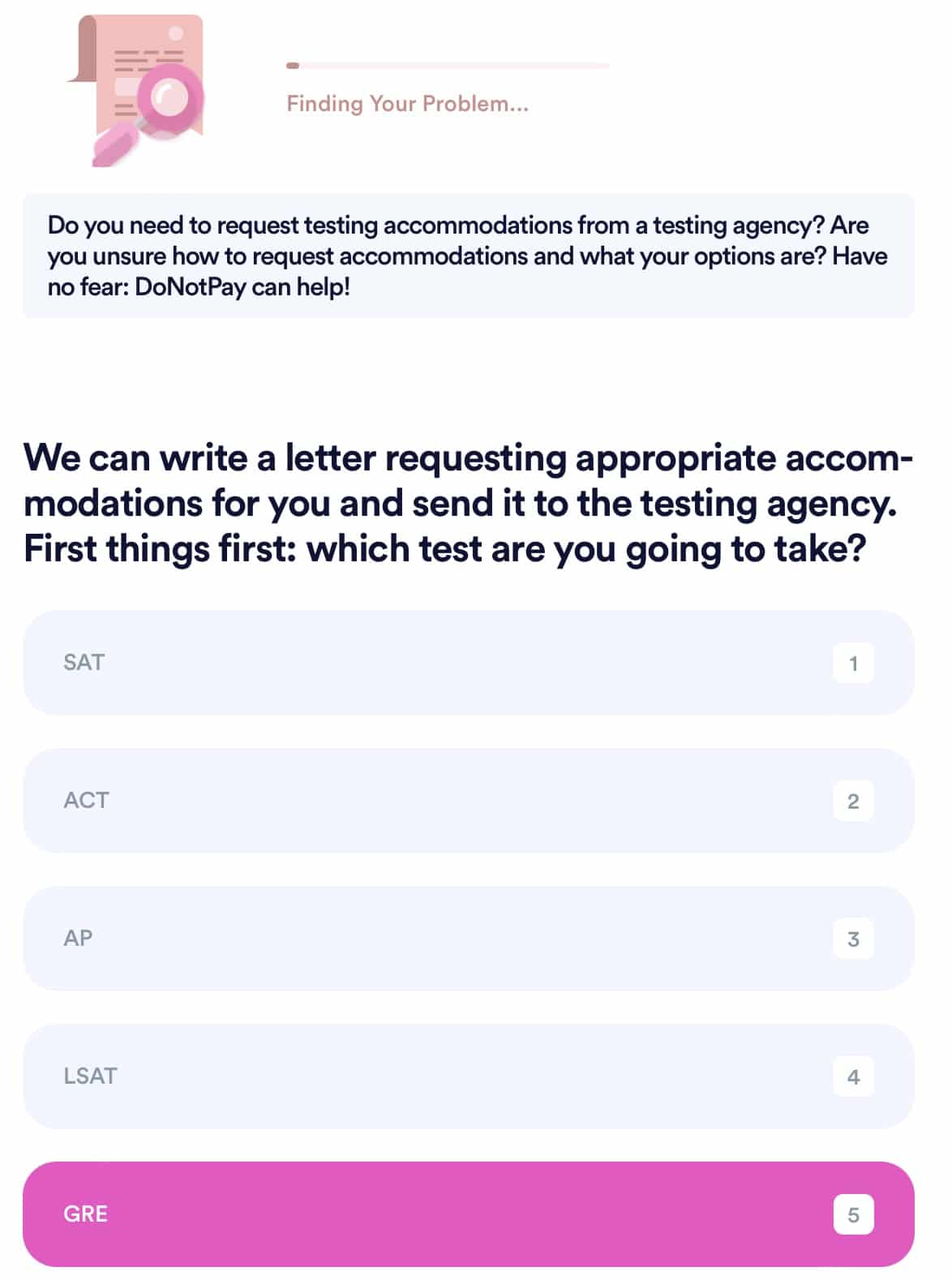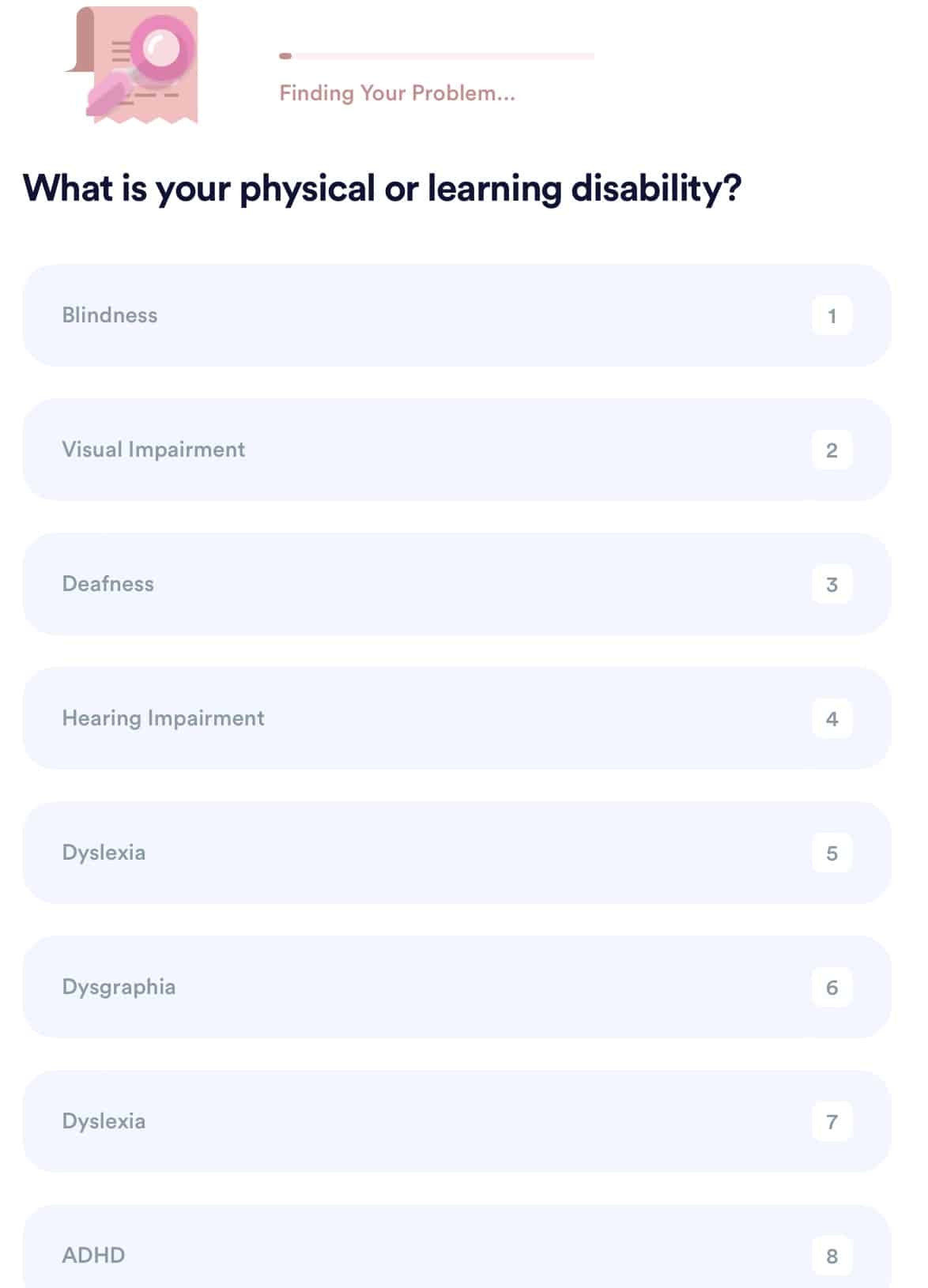What's the ACT Special Testing Phone Number
One in 16 public school students has IEPs, while 1 in 42 has 504 plans. Considering ACTs are one of the most challenging components of college admissions for students with learning challenges or disabilities, such students might not get the chance to get through the content in a way that reflects their actual academic potential.
Luckily, ACT testing accommodations enable eligible students to take the test under specific conditions. But navigating the accommodation process is tricky, especially without the correct and other aids. DoNotPay has everything you need to request for ACT testing accommodations successfully.
What Are ACT Testing Accommodations?
ACT test-takers must endure several tests, including Math, English, Reading, Science, and essay, in a little under four hours. Students with learning challenges or disabilities may struggle to complete the sections within the allocated time.
ACT accommodations are designed to ensure eligible students are not disadvantaged when sitting for the test. Some of the students that can apply for ACT test accommodation include those with:
- Learning disabilities
- Visual impairment
- Psychiatric disorders
- Hearing impairment
- Traumatic brain injuries
- Speech and language disorders
- Autism Spectrum disorders
- Attention-Deficit / Hyperactivity Disorder
Although ACT has streamlined the eligibility requirements and application process, ACT still relies on the Americans with Disabilities Act standard to determine whether accommodations are reasonable for the ACTs.
What Types of ACT Testing Accommodations Are Offered?
There are three broad types of ACT testing accommodations offered:
- Standard time national testing with accommodation – Students applying for this kind of accommodation can test at regularly scheduled national test centers with standard time limits and use either regular or large type test booklets. Examples of this type of accommodation include large type booklets, permission to mark answers in the booklet, wheel-chair accessible room, and a sign language interpreter.
- Extended Time National Testing – This accommodation type applies to students who need up to 50% more testing time. Approved applications have up to five hours for ACT without writing and up to six hours for ACT with writing.
- Special testing – Applies to students who cannot be accommodated at a regularly scheduled national test center. Special testing accommodations include receiving more than 50% extended time, testing over multiple days, and alternate test formats, among others.
Documentation to Prepare for Testing Accommodation Requests
Proper documentation is a critical aspect in requesting ACT testing accommodation. In the new guidelines, students under the Individuals with Disability Education Act (IDEA) and section 504 of the Rehabilitation act will automatically be eligible to receive allowable testing accommodations when they register for the ACT with accommodations.
Some of the documentation necessary for the test accommodation application include:
- EL Plan
- Official support or accommodations plan
- English language proficiency assessment results
- Confirmation of eligibility or participation in an English language program.
- Medical documentation, including tests and history of treatment
- Statement as to whether the condition is stable or progressive
The documentation must be written by a qualified professional, are current and describe the limitations caused by this disability on testing performance.
How to Request ACT Testing Accommodations
Here is the procedure for applying for ACT testing accommodations:
- Register for the ACT online.
Create an ACT account online and register for the ACT. List your preferred test center and indicate the kind of accommodation you need for the test.
- Wait for correspondence.
You will receive an email from ACT, Inc. explaining how to work with your school to submit a request for accommodations on the test. Forward the email to the school official together with a completed Consent to Release Information to ACT form.
- Submission
The school official will submit your request to ACT. Within 14 days of the submission, ACT will notify the school official of the decision. The official will then update you on the results and explain the steps.
What Types of Testing Accommodations Are Offered for ACT?
ACT testing accommodations vary depending on the application submitted. Some of the test accommodations include:
- Extended time beyond 50%
- Testing over multiple days
- Alternate test formats (braille, audio, and read out loud)
- Use of a computer or scribe for the ACT essay
For more information on available ACT accommodation, you can use the following :
| ACT Accommodation Support/Email | Contact Form |
| ACT Accommodations Contact Page | Help Page |
| Mailing Address | PO Box 414, Iowa City,
IA 522430414 |
| Phone Number | 319-337-1270 |
What Happens After I Make an ACT Accommodation Request?
The request is submitted through the Test Accessibility and Accommodations System (TAA) before the deadline, usually less than two months before the test. The average review time is 14 days, but it can be longer for special ACT testing requests.
If the accommodations are accepted, the school test coordinator receives an electronic response in TAA. Students are not automatically notified, so you have to follow up after about two weeks. If the request is approved, the student should log into their ACT account to print the registration ticket.
If the student's request for ACT accommodations is denied, the student can work with the school's test coordination to submit a reconsideration request. This may require submitting additional documentation or applying for different accommodations.
Request Testing Accommodations With DoNotPay
Requesting for ACT accommodation is a tedious and time-consuming process. It's constantly changing, and there's no guarantee of a positive outcome. DoNotPay can make the process easier and increase chances of success in the application process.
With the necessary understanding of the internal rules ACT and the disability laws, DoNotPay can send a letter to the testing company on your behalf and present the required information and evidence for the appropriate accommodation. The entire process follows a few simple steps:
- Search for testing accommodations on DoNotPay.

- Start our Request My Testing Accommodation product by telling us which test you intend to take.

- Answer some questions about your specific disability and testing plans.

And that's it!
DoNotPay Works Across All Companies, Entities, and Groups With the Click of a Button
DoNotPay is not just limited to requesting ACT test accommodation. You can also use it to request other standardized test accommodations like SATs, LSAT, and MCAT. It works across all states and for all types of accommodations, including special accommodations.
What Else Can DoNotPay Do?
Besides requesting ACT test accommodations, DoNotPay can also help you:
- Fight and waive fees
- Find and apply for scholarships
- Contact government representatives
- Reach various customer support services
Want to know more? Join DoNotPay today for and other incredible services!


